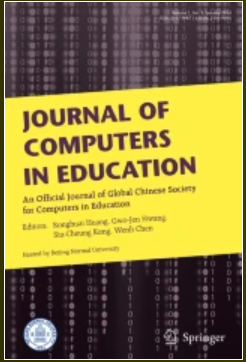学习者-内容互动过程中的认知存在:网络自我调节学习环境中脚手架的作用
IF 4.7
Q1 EDUCATION & EDUCATIONAL RESEARCH
引用次数: 0
摘要
在线探究中学习者-内容互动的有效性取决于培养学生认知在场的程度。本研究旨在了解在网络环境下,脚手架支持如何增强学习者-内容互动过程中的认知存在。结合预测观察解释(POE)教学框架,开发了两个入门科学概念学习模块。学生通过这些学习模块独立学习科学概念。数据来源包括模块后访谈、书面回复以及学生与在线学习模块互动的观察。讨论分析表明,所采用的教学框架可以有效地培养学生在学习者-内容互动过程中的认知在场。研究结果进一步表明,嵌入学习模块的脚手架元素有助于出现更高水平的认知存在,特别是对于具有先验知识的学生。相反,本研究提供的证据表明,即使有嵌入式脚手架和指导,学生也可能对科学概念产生误解。本研究需要进一步研究持续改进教学方法,以刺激高级和初级学习者的认知存在,并减少在学习者-内容互动过程中发生误解的潜在风险。本文章由计算机程序翻译,如有差异,请以英文原文为准。
Cognitive presence in learner–content interaction process: The role of scaffolding in online self-regulated learning environments
Abstract The effectiveness of learner–content interaction in online inquiry depends on the extent student cognitive presence can be fostered. This study sought to understand how scaffolding support enhances cognitive presence during the learner–content interaction process in the online environment. Two learning modules on introductory science concepts were developed incorporating the predict observe explain (POE) pedagogical framework. Students engaged with these learning modules to learn the science concepts independently. Data sources comprised post-module interviews, written responses, and observations of student interactions with the online learning modules. Analysis of discussions revealed that the adopted pedagogical framework can effectively foster student cognitive presence during the learner–content interaction process. Findings further revealed that the scaffolding elements embedded into the learning modules contribute to the emergence of higher levels of cognitive presence especially for the students with prior knowledge. Conversely, this study provides evidence that students may develop misconceptions about the science concepts even with the embedded scaffolding and guidance. This study calls for further research into the continual improvement of the pedagogical approach to stimulate cognitive presence for both advanced and novice learners and reduce the potential risk of misconceptions occurring during the learner–content interaction process.
求助全文
通过发布文献求助,成功后即可免费获取论文全文。
去求助
来源期刊

Journal of Computers in Education
EDUCATION & EDUCATIONAL RESEARCH-
CiteScore
14.50
自引率
1.60%
发文量
37
期刊介绍:
JCE is an interdisciplinary forum for communication of perspectives among researchers, practitioner, and policy makers on theories and practices in technology enhanced learning. The journal aims at making an impact on educational practices and thus to transform learning. The journal publishes up-to-date research and experiences in information communication technologies (ICT) in learning and education. Authors are encouraged to submit papers related, but not limited, to the following topics of interest:1. Hotspots and Frontiers – reporting on current research and policy initiatives as well as national or international key research projects in the field ICT in education. 2. Instruction and Design - theoretical and methodological issues related to instructional design, curriculum development, and the role of technology in instructional transformation, particularly issues from social, cultural, psychological, cognitive, and pedagogical perspectives. 3. Learning and Technology - issues of learning technologies from theoretical and pedagogical perspectives. Specifically, it covers ubiquitous learning, human intelligence as well as other emerging technologies in education. 4. Media and Tools - patterns of educational communications and state-of-the-art educational media as well as instructional tools, which encompass learning management systems, interactive learning systems, knowledge visual tools, thinking training tools, as well as educational virtual reality systems and educational games.5. Academic Reviews - reviews on important works and publications in the field of ICT in education.
 求助内容:
求助内容: 应助结果提醒方式:
应助结果提醒方式:


